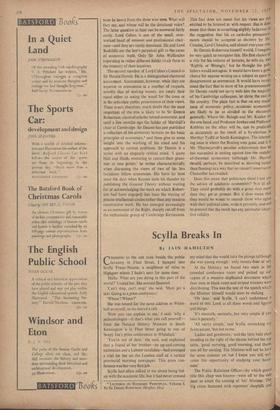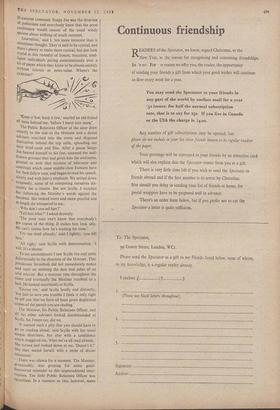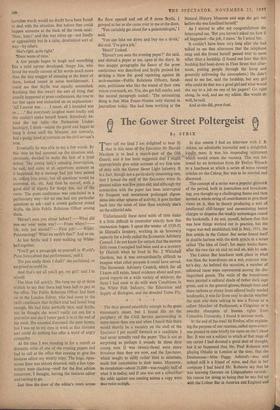Scylla Breaks In
By JAIN HAMILTON ROSSINCi to the cab rank beside the public L./lavatory in Fleet Street, I bumped into Scylla Fraser-Neame, a neighbour of mine in Highgate whom I hadn't seen for some time.
'Hallo. What are you doing in this part of the world?' I asked her. She seemed flustered.
'Can't stop, can't stop,' she said. 'Must get a taxi. Going to a press conference.'
'Whose? Where?'
She was bound for the same address in White- hall as myself, so we shared a cab.
'Now you can explain to me,' I said, 'why a palaeontologist—if that's what you call yourself— from the Natural History Museum in South Kensington is in Fleet Street going to one of Soapy Joe's press conferences in Whitehall.'
'You're out of date,' she said, and explained that a friend of her brother—an up-and-coming statistician and a Labour candidate—had arranged a trial for her on the London staff of a certain provincial morning newspaper. This press con- ference was her very first job.
Scylla had often talked to me about being fed- up with the academic life, but it had never crossed LECTURES ON ECONOMIC PRINCIPLES, Volume 1.
By Sir Dennis Robertson. (Staples, 16s.) my mind that she would take the plunge (although she was young enough : only twenty-four or so).
At the Ministry we found two seats in the crowded conference room and picked up our copies of a massive duplicated document which four men in black coats and striped trousers were distributing. This was the text of the speech which the Minister himself would soon be making.
'Oh dear,' said Scylla, 'I can't understand word of this. Look at all those words and figures and things.'
'It's uncouth, certainly,,but very simple if you take it patiently.'
'All vairry simple,' said Scylla, mimicking nil' Scots accent, 'but not to me.'
'Ladies and gentlemen,' said the little bald chap standing to the right of the throne behind the top table, 'good morning, good morning, and thank you all for coming. The Minister will not be here for some minutes yet but I know you will wel• come this opportunity of studying your hand- outs,' The Public Relations Officer—by which grand title this chap was known—went off to the side door to await the coming of 'his' Minister. The big room hummed with reporters' shoptalk and ill-natured comment. Soapy Joe was the dreariest of politicians and everybody knew that the press conference would consist of the usual windy spasms about nothing of much moment. 'Journalists,' said I, 'are more innocent than is sometimes thought. They're said to be cynical, and there's plenty to make them cynical, but just look round at this roomful of honest, truculent, intel- ligent individuals poring conscientiously over a lot of paper which they know to be almost entirely without interest or news-value. Where's the cynicism?'
'Keep it low, keep it low,' snarled an old friend of mine behind me, 'before I burst into tears.'
The Public Relations Officer at the door drew smartly to the side as the Minister and a dozen advisers marched into the room and disposed themselves behind the lop table, spreading out their brief-cases and files. After a pause Soapy Joe heaved himself to his feet, assumed the well- known grimace that had given him the nickname, 'greeted us with that mixture of tolerance and contempt which some middle-class Fabians have for their fellow men, and began to read his speech, slowly and with heavy emphasis. We settled down resignedly, some of us composing ourselves dis- creetly for a snooze. But not Scylla. I watched her following the Mini'ster's words against the handout. She looked more and more puzzled and at length she whispered to me : 'Why don't you tell him?'
'Tell him what?' I asked drowsily.
'The poor man can't know that everybody's got copies of the thing. It makes him look silly. He can't realise how he's wasting his time.'
'I'm too tired already,' said 1 lightly; 'you tell 'All right,' said Scylla with determination. 'I Will It's a shame.'
To my astonishment I saw Scylla rise and smile deferentially in the direction of the Minister. That Ponderous Stromboli did not immediately notice and went on emitting the dust and ashes of an arid interior. But a •murmur rose throughout the room and eventually the Minister rumbled to a halt. He looked uncertainly at Scylla.
'Excuse me,' said Scylla loudly and distinctly, but just to save you trouble I think it only right to tell you that we have all been given duplicated copies of the speech you are reading.'
The Minister, his Public Relations Officer, and all his other advisers looked dumbfounded at Scylla. So, Imust say, did we.
'It seemed such a pity that you should have to go on reading aloud,' said Scylla with her usual simple directness, but also with a confidence which staggered me, 'what we've all read already.' She turned and looked down at me. 'Doesn't it?' She then seated herself with a smile of divine innocence.
There was silence for a moment. The Minister, Presumably, was groping for some good- humoured rejoinder to this unprecedented inter- ruption. The little Public Relations Officer was speechless. In a moment or two, however, some harmless words would no doubt have been found to deal with the situation. But before that could happen someone at the back of the room said: 'Hear, hear I' and this was taken up—not loudly or aggressively but in a calm, determined sort of way—by others.
'She's right, quite right.'
'Sheer waste of time.'
A few people began to laugh and something like a mild uproar developed. Soapy Joe, who loved the woolly cocoon of his words much more than the tiny maggot of meaning at the heart of them, looked round in some bewilderment. I could see that Scylla was equally astonished. Realising that this wasn't the sort of thing that usually happened at press conferences, she rose to her feet again and embarked on an explanation: 'All I meant was . . . I mean, all I intended was to . . .' But everybody laughed more loudly and she couldn't make herself heard. Somebody be- hind the top table—the Permanent Under- Secretary, I think—seized the gavel and began to bang it down until the Minister, not unwisely, laid a pudgy hand of restraint on the civil servant's arm.
Eventually he was able to say a few words. By this time he had summed up the situation and, obviously, decided to make the best of a total defeat. The young lady's amusing interruption, he said, had come at an opportune moment as it happened, for a message had just been passed in, calling him away; but all questions would be answered, etc. etc. And then he moved, with a good deal of dignity for Soapy Joe, out of the room. The press conference was concluded in a perfunctory way—for no one had any particular questions to ask—and a crowd gathered round Scylla, the little Public Relations Officer among them.
'Haven't seen you about before? What did you say your name was? From where?
Oh, only just started? First job! What! Pakeontology! What on earth's that?' And so on. At last Scylla and I were walking up White- hall together.
'You'll get a paragraph to yourself in World's Press News about that performance,' said I.
'Do you really think I shall?' she exclaimed, as surprised as could be.
And that's not all you'll get, my girl ! said Ito myself.
The blow fell quickly. She rang me up at three o'clock to say that there had been hell to pay in the office. The Public Relations Officer had been on to the London Editor, who had come to the swift conclusion that Scylla's trial had lasted long enough. He had been perfectly nice, said Scylla, but he thought she wasn't really cut out for a journalist and she'd better pack it in at the end of the week. She sounded distressed, the poor honey, but I was up to my eyes in work at that moment and could do nothing but offer a word of angry sympathy.
At the time I was, standing in for a month as dramatic critic of one of the evening papers and had to call at the office that evening to give the features editor my weekly copy. The huge, open- access floor was almost deserted; only a few type- writers were clacking—stuff for the first edition tomorrow, I thought, leaving the features editor and turning to go.
Just then the door of the editor's room across the floor opened and out of it came Scylla. I gawped at her as she came over to me at the door. 'You certainly get about for a palxontologist,' I said.
'You can take me down and buy me a drink,' she said. 'I've got a job.'
`Here?' I asked.
'Haven't you seen the evening paper?' she said, and shoved a paper at me, open at the diary. In two snappy paragraphs the fiasco of the press conference was described and Scylla praised for striking a blow for good reporting against its arch-enemies—Public Relations Officers, hand-. outs, politicians who like the sound of their own voices overmuch, etc. Yes, she got full marks, and the second paragraph ended: The astonishing thing is that Miss Fraser-Neame only started in journalism today. She had been working at the Natural History Museum and says she got out before she was fossilised herself.'
As I started to offer rri, congratulations she interrupted me. 'But you haven't asked me how it all happened—the job, I mean.' So I asked her.
It couldn't have been very long after she had talked to me that afternoon that the telephone rang and she found herself passed over to none other than a lordship. (I found out later that this lordship had been down in Fleet Street that after- noon, putting people through the hoop and generally enlivening the atmosphere.) He didn't need to see her, said the lordship, but any girl who could do that was a good girl and what would she say to a job on one of his papers? Go right along, he said, and see my editor. She would do well, he said.
And so she did, poor dear.












































































 Previous page
Previous page